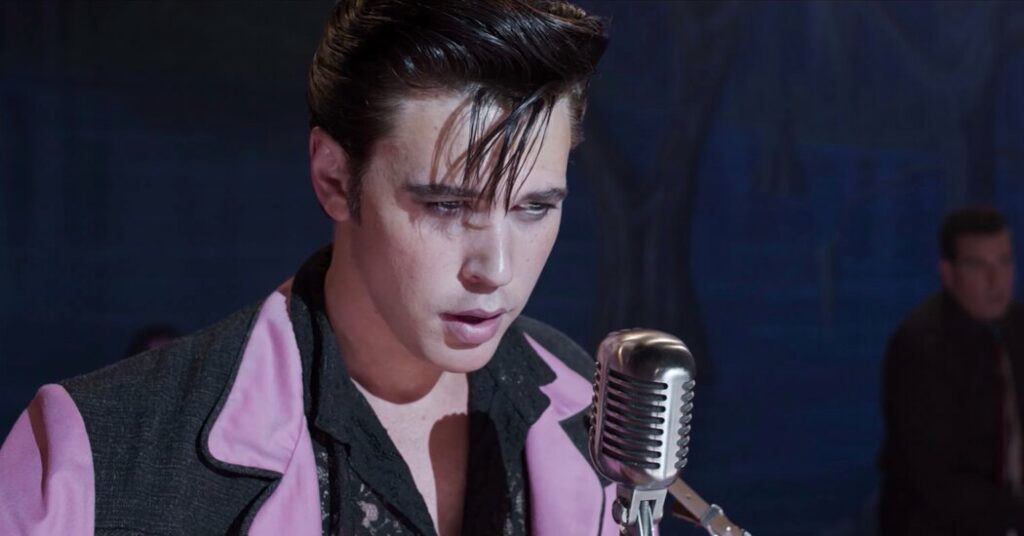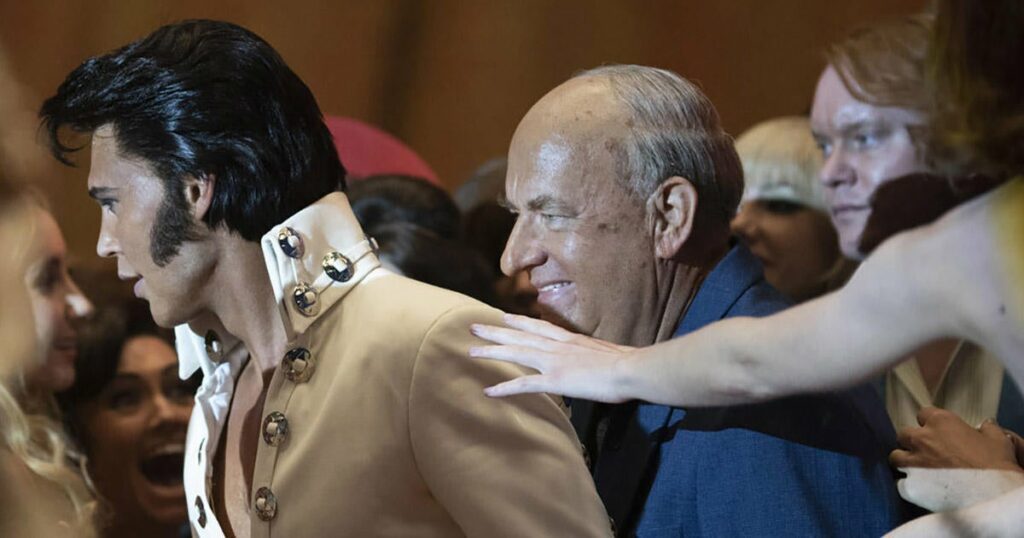The story of Elvis Presley is an American tragedy, a dazzling rags-to-riches odyssey brought to life onscreen with such zeal and excess from director Baz Luhrmann (Romeo + Juliet, Moulin Rouge!, The Great Gatsby) that it’s almost downright ostentatious, perhaps fittingly so. The King of Rock ‘n’ Roll was and continues to be a larger than life icon of American music, culture and identity; but as Luhrmann shows us in this glitzy musical biopic, bright stars like The King are all too often snuffed out by an even stronger American hallmark: Greed.
Elvis starts at the beginning, with the young Presley boy being born in Tupelo, Mississippi before moving and being raised in poverty in Memphis, Tennessee. Inspired and embraced by the predominantly Black neighborhoods and music that he grew up around, Elvis (Chaydon Jay plays the younger Elvis while Austin Butler plays him from teenager onward) develops his own unique sound and image that begins to give him significant local attention. Once he makes it on the radio, he catches the ears and eyes of Colonel Tom Parker (Tom Hanks), who has the golden ticket to make Elvis a superstar. But the young rock ‘n’ roller may as well have signed a deal with the devil.
The film hits familiar beats and moments of countless other music biopics, which feels mostly unavoidable when you’re condensing an entire life and career into the runtime of a movie - even if that movie is nearly three hours long. Luhrmann does at least have a genuine passion towards Elvis as both the artist and the person. When combined with the Australian filmmaker’s usual exuberance and maximalist style as well as exceptional performances from the cast (Butler in particular is transcendent), it makes Elvis one of the more impressive, energetic and fantastical films of the crowded and clichéd genre.

Courtesy of Warner Bros
The most interesting aspect of Lurhmann’s film is the decision to tell it from the perspective of Parker rather than the titular character. That’s not to say that Elvis isn’t the focus of the story (rest assured that he is) but choosing to have Parker - the man who swindled, abused and cheapened Elvis his entire career - as our narrator and throughline holds thematic significance. The meteoric rise to fame and fortune, all of its ebbs and flows, and the ultimate tragic end of the cultural icon is just as much thanks to Parker as Elvis himself. “Without me,” Hanks delivers in a bizarre, unplaceable yet menacing accent “There would be no Elvis Presley.” Presley is the radiant and inspiring talent, Parker is the American money machine chewing him up and spitting him back out.
Any of the film’s vibrant concert sequences are when things really pop. Elvis’ music feels grander than ever even over half a century later; a testament to the timelessness of his sound. The film’s soundtrack helps put emphasis on this as well by remixing select tracks with modern artists like Eminem, Doja Cat, Denzel Curry, Tame Impala and others. Much like the initial overstimulation of Luhrmann’s filmmaking style, hearing Elvis’ voice over hip hop beats can be a bit jarring at the start. However, things eventually begin to settle and become clearer the further the movie goes. What Elvis appears to be going for is a classic biopic with big modern production values, not to mention modern sensibilities.

Courtesy of Warner Bros
Elvis Presley was an unprecedented artistic force - a symbol of youthful rebellion and sexual liberation that also broke down barriers of race and culture. Luhrmann frames the devastating fall of The King within the sociopolitical context that contributed to it. In his film, Presley emerges from his impoverished but culturally rich upbringing as a potential uniter that could’ve stood on the same pedestals as figures like MLK Jr., Bobby Kennedy, Fred Hampton and others. America killed him just the same as it did those other figures.
Elvis is a colorful and grandiose spectacle that emulates the lit-up bombast of Las Vegas, the city where the legendary entertainer would wind up stuck in for the final years of his life. No longer performing for droves of screaming women and rowdy youth of the counterculture, Presley becomes trapped in a golden birdcage, stuffed full of overprescribed drugs and singing his deteriorating heart out for older, wealthier audiences who likely haven’t felt particularly passionate about anything in decades. It’s a slow and somber end to a roller coaster ride of a film. You know the ending, but there’s a genuine sense of hope that still manages to break through as the story is being told. Elvis is able to make small acts of rebellion against Parker and the rest of the system feel enormous. Elvis the movie feels that way, too.
‘Elvis’ is now playing in theaters.




